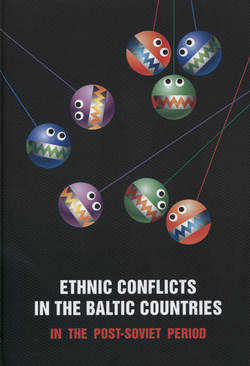Читать книгу Ethnic Conflicts in the Baltic States in Post-soviet Period - Сборник статей - Страница 11
На сайте Литреса книга снята с продажи.
Ethno-political conflicts and national identity in Latvia
Dr. pol. Mihail Rodin
Institute of European Studies, Latvia
Conclusion
ОглавлениеThe general conclusion as the result of conceptual approaches and empirical findings of our study, as well as in the detection of civil involvement in social and political life, gives evidence of the existence of two fundamentally divided political and ethno-cultural communities in the institutional dominance of the titular nation.
Integrative resource in society completely exhausted, and the rhetoric of social integration itself (imposed from the outside as one of the conditions of European integration) causes irritation and only vague associations. Perceptions of political community (otherwise, relating to the state), rather optimistic shared by the majority of Latvia’s population by the end of the 90’s, completely devalued in 2013. Attributes of the Latvian state and its recognizable markers, as well as the ideology of independence, is rapidly leveled out in one pot of market relations, European integration and uncontrolled migration. In the context of the primordial approach of national identity and ethnic conflict, the titular identity is conservative and capsulated. A margin of safety Latvian identity significantly is fueled by historical, cultural and linguistic symbols of the past. The dominant Latvian national identity, built-in vertical hierarchic ethnic stratification is the main moderator in ethnic relations. Mobilized ethnicity in the top positions of ethnic stratification leads to the concentration of elitarian and hegemonic tools for creating boundaries and sustainability of national identity and effective protection against outside pressure. The “right” ethnicity as a determining factor has the largest resource of competitiveness in comparison with other personal, professional and business skills. Multiplied by status and role, and ethnicity is the most important building material for the ethno-nationalism. Ethnic nationalism in Latvia is a functional tool for the ruling elite to preservation of ethno-political stratification and inequality, as well as a necessary means of maintaining the peripheral European economic hierarchical inequalities during the economic crisis.
Overall ethnic situation in Latvia conflictogenic, but ethnic conflict is not in the phase of the open manifestation and is not focused on violent forms of conflict. Orientation to the resistance to the regime and other forms of oppositional struggle to protect their own interests by ethnic minorities is related to the constitutional norms of individual and collective self-expression. The political protest as an expression of democratic values and civic responsibility does not possess resource legitimacy of the ruling elite and, in general, is realized only by ethnic minorities. However, one can readily admit provocative local director of mass ethnic confrontations in order to disguise the social confusion and the ongoing economic crisis. Focus on the resistance to the regime and other forms of oppositional struggle to protect their own interests by ethnic minorities, is related to the constitutional norms of individual and collective self-expression. The political protest as an expression of democratic values and civic responsibility has no resource legitimacy of the ruling elite and, in general, is realized only by ethnic minorities. However, one can readily admit provocative local directing of mass ethnic confrontations in order to disguise the social of disorder and the ongoing economic crisis.
Contrary to the popular mythologems of the structural looseness of the Latvian ethnic minorities, the inability to articulating their interests, lack of political leaders who can take charge, and the cultivation by the power elite purely cultural mission of the non-titular population, ethnic minorities have become an effective political actor. The political aspirations of ethnic minorities in Latvia for the redistribution of power in order to build a consensual representative democracy, has constitutional and legitimate character, which in turn causes the ethnic mobilization of the titular nation and the a splash of radical ethnic nationalism.
The practice of economic and political exclusion of ethnic minorities in Latvia is closely linked to their cultural alienation and cultural status hierarchy. Separation of Russian and other ethnic minorities, ethnicity, language, culture, religion, ethnic homeland, cause from the Latvian government agencies accusations of disloyalty, and leads to a limitation of their political rights and the suppression of ethnic minority cultures. This fact is an obstacle to the democratic development of ethnic and cultural diversity in Latvia through culturally inclusive policies.
Latvian ruling elite having all resources of the institutional and ideological hegemony is the principal designer and conductor of ethnic politics. The content of the Latvian ethnic policy is actually a political and socio-economic revenge of the titular nation and the protection of the Latvian language. National ethnic policy is probably the most consistent and unchanging set out strategy and foreign policy of Latvia.
The outcome of the Latvian ethnic policy is applicable for the Latvian political system known ideas of Samuel Huntington’s clash of civilizations with the cultural vacuum of ethnic tolerance and cultural manifestation of the conflict. The former focus on the development of national and multicultural forms of international communication (often – in the form of intentions, rare – in acts of social policy) as a result of long-term ethno-political conflict and inequality embodied in the existence of a rigid line of demarcation between the dominant ethnic majority and subordinated ethnic minorities. The political formula of “us and them”, former being journalist metaphor has become the new Latvian political reality.
